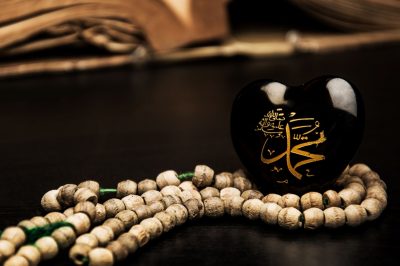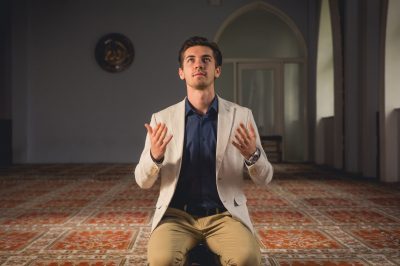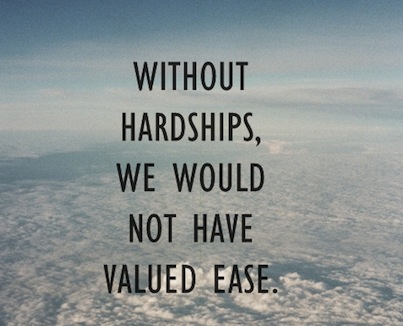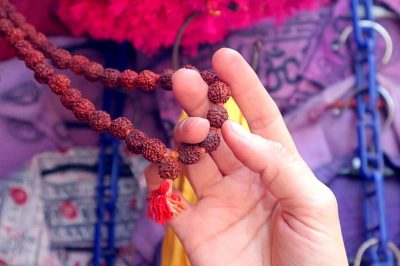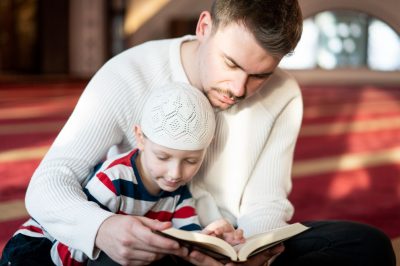L’air s’abat sur ma tête. Je sens le mouvement des hélices de mon vieux ventilateur berçant mon Khimâr (voile). Mes yeux fixent le tapis rugueux couleur d’avoine et je ressens comme un massage sous mes pieds.
Des Distractions A L’infini
Je me lève, m’incline, me prosterne. Et je recommence.
«Que vais-je préparer pour le dîner? Est-ce que ça sera bon?»
Pourtant, je dois me concentrer. Je m’incline.
«Est-ce une tâche ou une punaise sur le tapis?! J’ai beau nettoyer, je n’y arrive jamais?»
Concentration.
«Si je dois me lever tôt jeudi, à quelle heure dois-je me coucher. Dois-je simplement boire plus de café? Dans tous les cas, mon esprit sera brumeux donc qu’importe!»
Concentration!
Je me prosterne. Mon téléphone vibre dans l’autre pièce. Qui est-ce?
Concentration!!
C’est difficile de se concentrer pendant la prière avec des enfants qui courent autour de vous.
CONCENTRATION.
Je me lève, je récite et je recommence.
Après 17 ans de pratique, je me bats encore avec mon esprit car mon Khouchou` (humilité) pendant la prière est très fluctuant.
Parfois, j’ai l’impression que tout le monde y arrive sauf moi. Je suis comme une enfant pendant la prière alors que tous les autres sont devenus matures dans leur pratique. Hélas, je suis dans une mer pleine d’experts en espérant y arriver.
Je rumine ces pensées en dehors de la Salât:
«Tout le monde est meilleur que toi. Tu es pathétique et tu échoues même pour la pratique la plus basique et la plus fondamentale de ta foi. Pourquoi essaies-tu déjà? Tu as échoué. Pourquoi recommencer pour échouer à nouveau?»
Pensées Absurdes
Ces pensées sont évidemment absurdes. La plupart des gens ont du mal avec le Khouchou` pendant la prière et le vrai échec, c’est d’abandonner. Lutter ou faire de son mieux est une réussite. Mais si je les laisse, ces ruminations pitoyables prendront le dessus. Elles sont comme une mauvaise herbe qui étrangle tout sur son passage.
Pour moi et pour beaucoup de personnes comme moi, ce n’est ni la connexion avec Allah (Gloire à Lui) ni la prière qui posent problème. C’est ce sombre dialogue interne. Pour ceux qui doivent installer la prière dans leurs vies, c’est souvent ce même problème. Des idées décourageantes, comme:
«Pourquoi commencer maintenant? Sera-t-on cohérent? Sûrement pas, alors pourquoi essayer?…»
Bizarrement, la plupart d’entre nous laissent cette mauvaise voix intérieure mal nous parler alors que dans la vraie vie, on ne laisserait jamais d’autres personnes nous parler de la sorte.
Qui écouterait quelqu’un lui dire des choses horribles comme:
«Tu es vraiment débile! Tu es gros! Personne ne t’aimera. Je ne sais pas comment tu as fait pour avoir ce que tu as. C’était sûrement un coup de chance.»
Pourtant, beaucoup laissent ces idées prendre le dessus et leur contrôler l’esprit. Mais en fait, on a plus de contrôle sur ce dialogue qu’on ne le pense.
Que ce soit en prière, ou en prière régulière, ou même vis-à-vis de notre image de soi, nous laissons cette voix – qu’elle vienne de Satan ou de notre dialogue interne – nous contrôler.
Comment L’arrêter?
Mais pourquoi? Et comment arrêter ce schéma mental de nous rabaisser par des idées destructrices dans la vie et dans la religion?
La réponse est plus simple qu’on ne le croirait.
C’est comme se débarrasser d’une mauvaise herbe; ce dialogue négatif peut être repoussé. A chaque fois qu’une pensée négative apparaîtra dans votre esprit, le fait de penser activement à quelque chose d’affirmant, de positif ou de constructif annulera la pensée négative.
Réécrivez le dialogue!
Cela paraît comme une solution trop simple et insensée. Devinez quoi? C’est le sombre dialogue qui vous dit d’abandonner avant de réussir. C’est la petite voix qui nous dit que cela ne vaut pas la peine car nous ne sommes pas assez forts pour changer.
Rediriger les pensées négatives et autodestructrices nécessite du temps et de la pratique. Mais à chaque fois que vous penserez que vous en êtes incapable, demandez à cette pensée de se taire, car Allah (Gloire à Lui) vous en a donné la capacité.
A chaque fois que cette petite voix dans votre tête vous dira que vous ne serez jamais cohérent durant la prière et de ne pas essayer, chassez-la, car si Allah (Gloire à Lui) a imposé la prière, c’est que vous en êtes capable.
Lorsque vous êtes debout pour la prière et que les pensées de la journée s’infiltrent dans votre tête, même si elles ne sont pas négatives, c’est la même voix qui essaie de vous distraire de cette grande action. Ecartez-les et réfléchissez à ce que vous êtes en train de dire. Pensez à votre rencontre avec Allah. Pensez aussi à votre connexion avec Lui.
Je me bats encore avec cette distraction intérieure pendant la prière et dans les autres moments. Mais avec la pratique, c’est devenu plus facile. J’ai pu progresser dans ma confiance et dans mon Khouchou`. Mais je sais aussi que c’est un combat à long terme.
C’est une forme de Jihad d’affirmer, qu’en tant que créature d’Allah (Gloire à Lui), nous avons tous été parfaitement créés avec le succès inscrit dans notre ADN. Nous devons juste Hayya `alâ al-falâh (accourir vers la félicité).
Vous pouvez lire la version anglaise originale de cet article ici.
The post Développer Le Khouchou` Pendant La Prière – Apprendre Un Savoir-Faire De La Vie appeared first on About Islam.
source
https://aboutislam.net/fr/developper-le-khouchou-pendant-la-priere-apprendre-un-savoir-faire-de-la-vie/
 Read Also: Waking up for Fajr Prayer: Any Tips?
Read Also: Waking up for Fajr Prayer: Any Tips?


